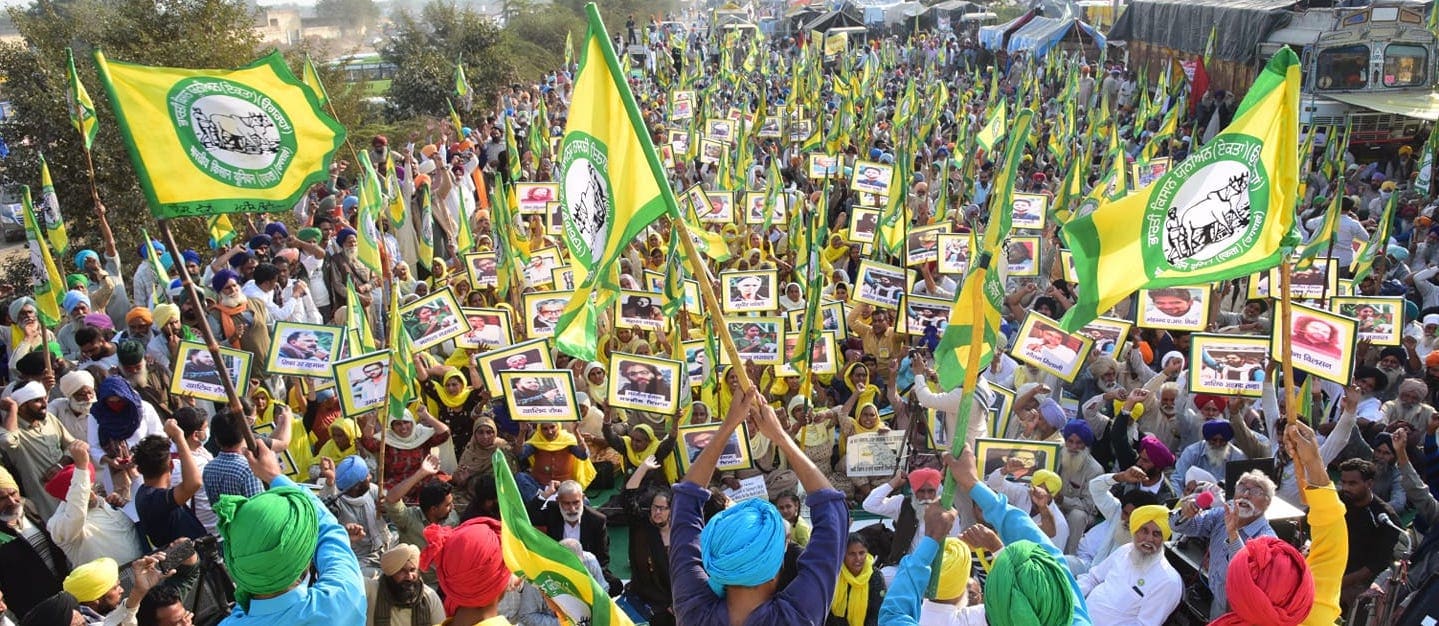
Indian Farmers: The Biggest Organized Labor Protest In History?
How to support the farmers' protests in India
This article was written by the NooWorld Editorial Team. To submit an article for publication, please write editor@noo.world
An epic battle is being fought in India, as small farmers stand up to corporate agriculture, neoliberalism, and far-right autocracy. And now, our activist brothers and sisters are under attack too.
Small farmers are the backbone of Indian life. The numbers speak for themselves: almost 60 percent of India’s workers are farmers, and almost 90 percent of them farm 2 hectares or less—making them mostly small-scale or subsistence farmers. And they’ve been exploited and oppressed for centuries: first by feudal lords and colonizers, then by corporate agriculture—and now by their own government.
In September 2020, Modi’s far-right government passed a series of deregulation laws that would spell death for India’s small farmers. By removing state buying protections for crops, the laws would force farmers to sell directly to the private sector, where corporate behemoths will be free to exploit them and further invade the market.
But this story doesn’t end there. These farmers are putting up a hell of a fight—maybe the biggest organized labor protest in history, in fact. And it’s all down to the power of coalition.
In November, 250 million Indian workers went on strike—not just farmers but people in a range of industries, taking action together. As of today, farmers are still occupying the outskirts of New Delhi, though they face brutal clampdowns from the police and government. Meanwhile, local Fridays for Future founder Disha Ravi was jailed for supporting the strike by publishing an activist toolkit.
Activists, it’s time to extend the Indian farmers’ mighty coalition around the world. Here’s why:
What’s at stake?
- Climate stability: agriculture already contributes 20 percent of global greenhouse emissions, and corporate farms are among the world’s biggest polluters.
- Sustainable farming practices worldwide: corporate agriculture favors monocropping supported by pesticides—practices that destroy soil, poison wildlife, contaminate water and ecosystems, and degrade land. The fight between sustainable and corporate agriculture is a global struggle, with an estimated 70 percent of farms worldwide owned by 1 percent of farms.
- Human life: the livelihoods of almost 60 percent of the Indian population, plus the dozens of people who have died in the protests.
- Democracy and activist freedom: far-right, autocratic governments and movements threaten the world. Beyond unilaterally ruining farmers, the Indian government has used the strike to crack down on and imprison organizers, including young climate activist Disha Ravi
HOW TO TAKE ACTION: FROM HOME
CREATE PRESSURE
Pressed for time? You can quickly increase awareness of the farmers’ fight by tweeting your support using the hashtags #FarmersProtest and #StandWithFarmers. Then add your voice to petitions in the US or the UK, and sign #AskIndiaWhy’s petition calling on the UN to ask India to confirm its support for freedom to dissent.
Put international pressure on the Indian government by contacting your representative and encouraging them to raise their voice against the treatment of India’s farmers and protestors. United Sikhs and Sikh Coalition both offer letter templates for US residents.
DONATE
The Indian farmers haven’t requested any donations, but you can support small farmers in the US by donating to Family Farm Action, a nonprofit that supports small farmers, lobbies against farming monopolies, and aims to help Black farmers gain the legal titles to their own farms. Or support sustainable farming practices by donating to the California-based Ecological Farming Association.
HOW TO TAKE ACTION: IN YOUR COMMUNITY
Students! Activists! Our ranks are being thrown in jail! Stand in solidarity with teen activist and Fridays for Future founder Disha Ravi by joining your local Fridays for Future.
To put extra pressure on the Indian government, consider getting together a coalition of your local climate orgs (such as Fridays for Future, XR, and 350) protesting at your local Indian embassy.
Or join the regenerative farming movement by becoming a soil advocate via Kiss the Ground.